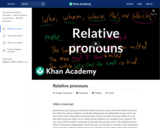
Overview of the ModulesIntroduction: Purpose and Function of Adjective ClausesWhy should I care about adjective clauses?What do adjective clauses do?What do adjective clauses look like?Adjective clauses vs. Noun clauses vs. Adverb clausesAuthentic English AnalysisAbout Relative PronounsCombining Two Sentences with an Adjective ClauseList of Relative PronounsRelative Pronouns: Subject or Object of the Adjective Clause?Identifying vs. Non-Identifying Adjective ClausesRelative Pronouns: Object of a PrepositionWho vs. Whom?Less Common Relative PronounsWhose vs. Who'sWhen, Where, and Why as Relative PronounsCommon Problems with Adjective Clauses
- Subject:
- Composition and Rhetoric
- Language Education (ESL)
- Language, Grammar and Vocabulary
- Material Type:
- Lesson
- Author:
- Sharon Tjaden-Glass
- Date Added:
- 03/24/2022


